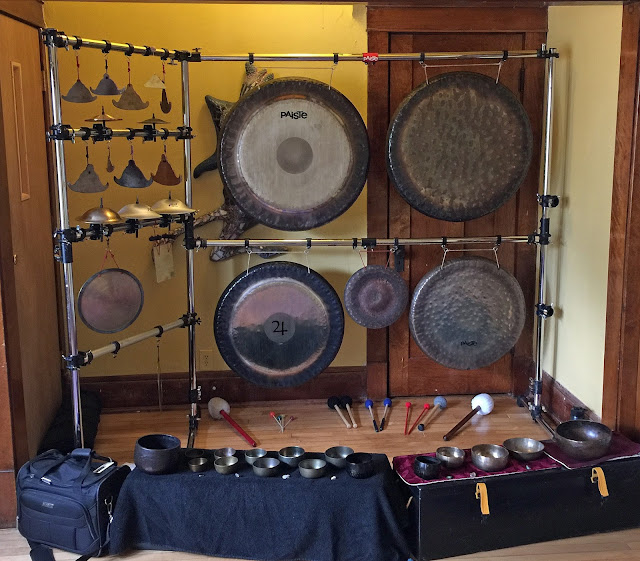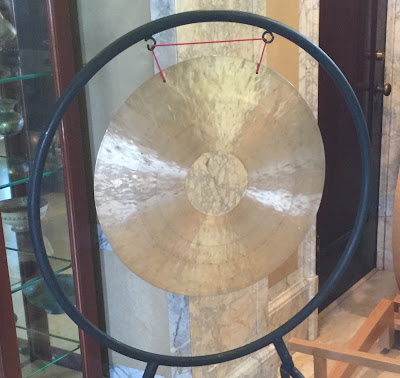The Art of Sound, Part 3
For The Want Of A Song
I’m a child of the 60’s, so I grew up listening to pop music. I love 60’s pop because it was so melodic, so singable. I love a good song and a good voice. Scott Walker, Dusty Springfield, Lulu and so many of the other 60s pop stars really are etched deep in my brain. And so is the idea of melody.
Melody is so important to me. Even as a drummer/percussionist, I'm always playing with melody in my mind. This goes especially with the Gongs, bells, and bowls. I've hand picked (or maybe ear picked) all of my instruments to form a melodic whole. I think of my set up as an orchestra in itself, with different sections and different voicings.
Context Is Everything
I listen to a lot of string music, like quartets or solo violin/cello. So when I play, I try to emulate string players. I think about connecting notes and phrases like they do, as more a continuum of notes, not separate notes.
I’m a child of the 60’s, so I grew up listening to pop music. I love 60’s pop because it was so melodic, so singable. I love a good song and a good voice. Scott Walker, Dusty Springfield, Lulu and so many of the other 60s pop stars really are etched deep in my brain. And so is the idea of melody.
Big Louise, sung by Scott Walker. Can you emulate that voice?
Melody is so important to me. Even as a drummer/percussionist, I'm always playing with melody in my mind. This goes especially with the Gongs, bells, and bowls. I've hand picked (or maybe ear picked) all of my instruments to form a melodic whole. I think of my set up as an orchestra in itself, with different sections and different voicings.
Context Is Everything
I listen to a lot of string music, like quartets or solo violin/cello. So when I play, I try to emulate string players. I think about connecting notes and phrases like they do, as more a continuum of notes, not separate notes.
It’s the same with saxophone. I listen to John Coltrane, Sonny Rollins, Wayne Shorter and others. I want to play in connected notes and phrases like they do. I want to tell a story like all the great jazz soloists do.
And I think of singers. There is something so pure and immediate about the human voice. It was most likely the very first instrument our long ago ancestors used, with some sort of percussion most likely next. So there's a strong connection here. And again, I look to songs for melody, phrasing, and how to tell a story.
A Method To My Madness
A Method To My Madness
When I play a Gong Session, while there is a lot of improvising, nothing is random. I never strike an instrument just because it's there. There has to be a reason, a need to strike something. And it has to make sense in the context of the greater continuum of what I'm playing.
With percussion, it's so tempting and so easy to just start hitting things, because the instruments are there and they make glorious noises. But I've had more than one improvising percussionist bore me to tears because there was no method to their madness. Maybe you want your music to sound like an open trap case falling down a long flight of stairs, with its contents spilling out all over the steps, making an almighty clatter, but I don't want to hear that.
I try to play with at least some sort of purpose. I'm always asking myself, “Is this the right time to strike this? And is this the right instrument/sound at this time?” Granted, these questions, and their respective answers happen in micro-seconds, but the questions are always asked on an intuitive/spiritual level.
But none of this just happens. I've worked on my art for over 50 years now. Everything I do, every sound I make, is backed up by all of the time I have practiced or performed in the past. And it's also backed up by all my years of studies in other fields, like spirituality, science, literature, art and alchemy. So I feel confident in what I do, but I don't just rest on that. I'm always working to be a better player, to have my work flow better, and to always make a better sound.
For me, it's all about the sound.
~ MB
But none of this just happens. I've worked on my art for over 50 years now. Everything I do, every sound I make, is backed up by all of the time I have practiced or performed in the past. And it's also backed up by all my years of studies in other fields, like spirituality, science, literature, art and alchemy. So I feel confident in what I do, but I don't just rest on that. I'm always working to be a better player, to have my work flow better, and to always make a better sound.
For me, it's all about the sound.
~ MB
Chop Wood / Carry Water / Play Gongs™ / Make A Good Sound




Comments
Post a Comment